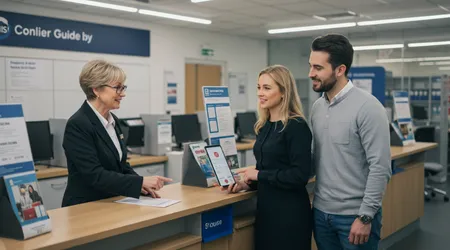How to Open a Bank Account in the UK: Full Guide

How to open a bank account in the UK can feel like navigating a maze, especially with evolving regulations and digital banking trends in 2025.
Whether you’re a new resident, an international student, or a business owner, understanding the process is crucial for financial stability.
This guide cuts through the complexity, offering a clear, practical roadmap to secure your account with confidence.
From choosing the right bank to meeting documentation requirements, we’ll explore every step with real-world insights, ensuring you’re equipped to make informed decisions in today’s fast-paced financial landscape.
The UK’s banking sector is robust, blending traditional institutions like Barclays and HSBC with innovative digital banks like Monzo and Starling.
In 2025, the rise of fintech continues to reshape how accounts are opened, with online applications streamlining processes.
Yet, challenges like strict identity checks and varying bank policies persist.
This article provides a detailed, human-crafted guide, grounded in current practices, to help you navigate these hurdles. Ready to take control of your finances? Let’s dive in.
Why Opening a UK Bank Account Matters
A UK bank account is your gateway to managing daily finances, from paying bills to receiving salaries. Without one, you’re like a sailor without a compass, struggling to navigate essential transactions.
In 2025, 92% of UK adults use a current account for regular payments, per Statista, underscoring its necessity. Beyond convenience, an account establishes your financial footprint, critical for credit applications or renting property.
Choosing the right account aligns with your lifestyle. Students might prioritize fee-free digital banks, while professionals may need accounts with overdraft options.
++ Best Free Budgeting Apps for UK Residents in 2025
The decision impacts your financial flexibility, so understanding your needs is key. Banks also offer perks like cashback or travel insurance, which can add value.
Moreover, a UK account ensures compliance with local regulations. For non-residents, it simplifies tax reporting and reduces currency exchange hassles.
Opening an account early sets you up for seamless integration into the UK’s financial ecosystem, saving time and stress.

Types of Bank Accounts Available in 2025
The UK offers diverse bank accounts tailored to different needs. Current accounts, the most common, handle daily transactions like direct debits and transfers.
How to open a bank account in the UK starts with identifying which type suits you best, whether it’s a basic account for essentials or a premium one with added benefits.
Savings accounts, like ISAs, offer tax-free interest for long-term goals. Business accounts cater to entrepreneurs, providing tools for invoicing and expense tracking.
Digital banks like Revolut now offer multi-currency accounts, ideal for frequent travelers or expats. Each type has unique features, so compare fees, interest rates, and accessibility.
Also read: What Is the Lifetime ISA and Who Should Use It?
Specialized accounts, such as student or joint accounts, address specific needs. For instance, Santander’s student account offers a free railcard, perfect for young scholars.
Understanding these options ensures you pick an account that aligns with your financial goals and lifestyle.
Eligibility and Documentation Requirements
Eligibility for a UK bank account hinges on proving your identity and residency. Most banks require a valid passport or driving license, plus proof of address, like a utility bill.
How to open a bank account in the UK involves gathering these documents upfront to avoid delays.
Non-residents face stricter checks. Some banks, like HSBC’s Expat Account, accept international IDs but may require a minimum deposit.
Students need a university acceptance letter, while businesses must provide registration documents. In 2025, digital verification tools streamline this process, but accuracy remains critical.
Recent regulatory updates emphasize anti-money laundering checks. Missing or outdated documents can lead to rejections, so double-check requirements.
Read more: UK Inflation Update June 2025: How Rising Prices Affect Your Budget
For example, Monzo’s online process requires a selfie with your ID, blending convenience with compliance. Preparation is your strongest ally here.
Banks may also ask for proof of income or employment status, especially for premium accounts. For instance, Lloyds’ Premier Account demands a minimum annual income of £75,000.
Ensuring your documents are current and complete prevents frustrating setbacks during the application process.
Step-by-Step Process to Open Your Account
Starting your journey to how to open a bank account in the UK begins with research. Compare banks based on fees, accessibility, and perks.
Traditional banks like NatWest offer in-branch support, while digital banks prioritize speed. Choose based on your priorities convenience or comprehensive services.
Next, gather your documents: ID, proof of address, and any specific requirements like a student visa.
Most banks allow online applications in 2025, but some, like Barclays, may require an in-person visit for non-residents. Submit your application accurately to avoid delays.
After submission, verification takes 1-5 days, depending on the bank. Digital banks like Starling often approve faster, using AI-driven checks.
Once approved, you’ll receive your account details and debit card. Activate online banking immediately to start managing your funds.
For example, Jane, an international student, used Monzo’s app to open an account in 10 minutes, uploading her passport and university letter.
Conversely, Tom, a freelancer, chose Lloyds for its business account tools but needed an in-branch visit. Tailor your approach to your circumstances.
Choosing Between Traditional and Digital Banks
The debate between traditional and digital banks shapes your account-opening experience. Traditional banks like HSBC offer in-person support and diverse services, ideal for complex needs.
How to open a bank account in the UK with a traditional bank often involves branch visits, appealing to those valuing face-to-face interaction.
Digital banks, like Monzo or Starling, prioritize speed and user-friendly apps. In 2025, their AI-driven onboarding processes minimize paperwork, perfect for tech-savvy users.
However, they may lack advanced services like mortgages. Compare based on your lifestyle do you need branch access or digital convenience?
Consider fees and features. Traditional banks may charge for international transfers, while digital banks often offer fee-free options.
For instance, Revolut’s multi-currency account suits frequent travelers, but Barclays’ overdraft options benefit those needing credit. Weigh pros and cons carefully.
For small businesses, traditional banks provide robust tools like invoice tracking, while digital banks excel in real-time budgeting.
Emma, a café owner, chose NatWest for its business loans, while Liam, a digital nomad, picked Revolut for its currency flexibility. Your choice should reflect your priorities.
Navigating Challenges and Common Pitfalls
Opening a bank account isn’t always smooth. Non-residents often face rejections due to incomplete documentation or unclear residency status.
How to open a bank account in the UK requires anticipating these hurdles to save time and frustration.
Credit checks can be a barrier, especially for new arrivals with no UK credit history. Basic accounts, like Barclays’ Cash Account, bypass this, offering a solution.
Another pitfall is choosing an account with hidden fees always read the fine print to avoid surprises.
Delays in verification are common if documents don’t match. For example, a misspelled name on a utility bill can stall your application.
Double-check details before submission. Digital banks often flag inconsistencies faster, so ensure accuracy from the start.
Language barriers or unfamiliarity with UK banking terms can also complicate the process.
Many banks offer multilingual support, but preparing key terms like “sort code” or “direct debit” helps. Proactive preparation minimizes these obstacles, ensuring a smoother experience.

Leveraging Technology for a Seamless Experience
In 2025, technology transforms how to open a bank account in the UK. Digital banks use AI to verify identities in minutes, reducing paperwork.
Apps like Monzo’s guide users through each step, offering real-time updates on application status.
Biometric authentication, like facial recognition, enhances security and speeds up onboarding. For instance, Starling’s app uses selfie verification, making the process intuitive.
Traditional banks are catching up, with Lloyds offering partial online applications, blending tech with in-person options.
However, tech isn’t flawless. System glitches or poor internet can disrupt applications. Always save progress and keep physical document copies as backups.
Technology streamlines the process, but human oversight ensures accuracy.
For businesses, fintech platforms like Tide integrate accounting tools, syncing with apps like Xero.
This saves time for entrepreneurs like Sarah, who opened a Tide account to manage her startup’s finances. Embrace tech, but stay vigilant to maximize its benefits.
Table: Comparison of Popular UK Banks for Account Opening (2025)
| Bank | Account Type | Application Method | Key Features | Processing Time |
|---|---|---|---|---|
| Monzo | Current, Savings | Online/App | Fee-free spending abroad, budgeting | 1-3 days |
| Barclays | Current, Business | Online/In-branch | Overdraft options, branch support | 3-7 days |
| Starling | Current, Joint | Online/App | Real-time notifications, no fees | 1-2 days |
| HSBC | Current, Expat | Online/In-branch | Global transfers, expat services | 3-5 days |
| Revolut | Multi-currency | Online/App | Currency exchange, crypto trading | 1-3 days |
Source: Bank websites and customer reviews, accurate as of June 2025.
Maintaining Your Account: Tips for Success
Once you’ve mastered how to open a bank account in the UK, maintaining it is key. Set up direct debits for bills to avoid missed payments. Regularly check statements via apps to track spending and catch errors early.
Enable security features like two-factor authentication to protect against fraud. In 2025, cyber threats are rising, so update passwords frequently. For example, HSBC’s Secure Key app adds an extra layer of protection, ensuring peace of mind.
For businesses, reconcile accounts monthly to maintain accurate records. Tools like Starling’s budgeting features help freelancers like Mark monitor cash flow. Stay proactive regular maintenance keeps your account functional and secure.
Explore additional services, like savings goals or investment options, to maximize value. Many banks offer cashback or rewards use them wisely. Staying engaged with your account ensures it serves your evolving financial needs.
Conclusion: Your Path to Financial Confidence
Mastering how to open a bank account in the UK is more than a checkbox it’s your foundation for financial success in 2025.
From selecting the right bank to navigating documentation, each step builds your confidence in the UK’s dynamic banking landscape.
Whether you’re drawn to the speed of digital banks or the reliability of traditional ones, the choice is yours to align with your goals. Isn’t it time you took control of your financial future?
This guide has walked you through the essentials, from eligibility to technology’s role, with practical examples like Jane’s swift Monzo setup or Emma’s strategic NatWest choice.
The UK’s banking system, blending innovation and regulation, offers opportunities for everyone students, expats, or entrepreneurs.
Stay proactive, keep documents ready, and leverage tools like biometric apps to simplify the process.
With 92% of UK adults relying on bank accounts, per Statista, joining them positions you for stability and growth. Start today, and make your financial journey in the UK a success.
FAQs: Common Questions About Opening a UK Bank Account
Do I need a UK address to open an account?
Yes, most banks require proof of a UK address, like a utility bill or tenancy agreement. Some digital banks accept international addresses for expat accounts.
Can non-residents open a UK bank account?
Absolutely, but requirements vary. HSBC and Barclays offer expat accounts, often needing a minimum deposit or proof of income. Check bank-specific policies.
How long does the process take?
Online applications, like Monzo’s, take 1-3 days. Traditional banks may need 3-7 days, especially for in-branch processes or non-residents.
What if I have no credit history in the UK?
Opt for a basic account, like Barclays’ Cash Account, which skips credit checks. These are ideal for students or new arrivals.
Are digital banks safe?
Yes, banks like Starling and Monzo are FCA-regulated, ensuring deposit protection up to £85,000. Always verify a bank’s regulatory status.
